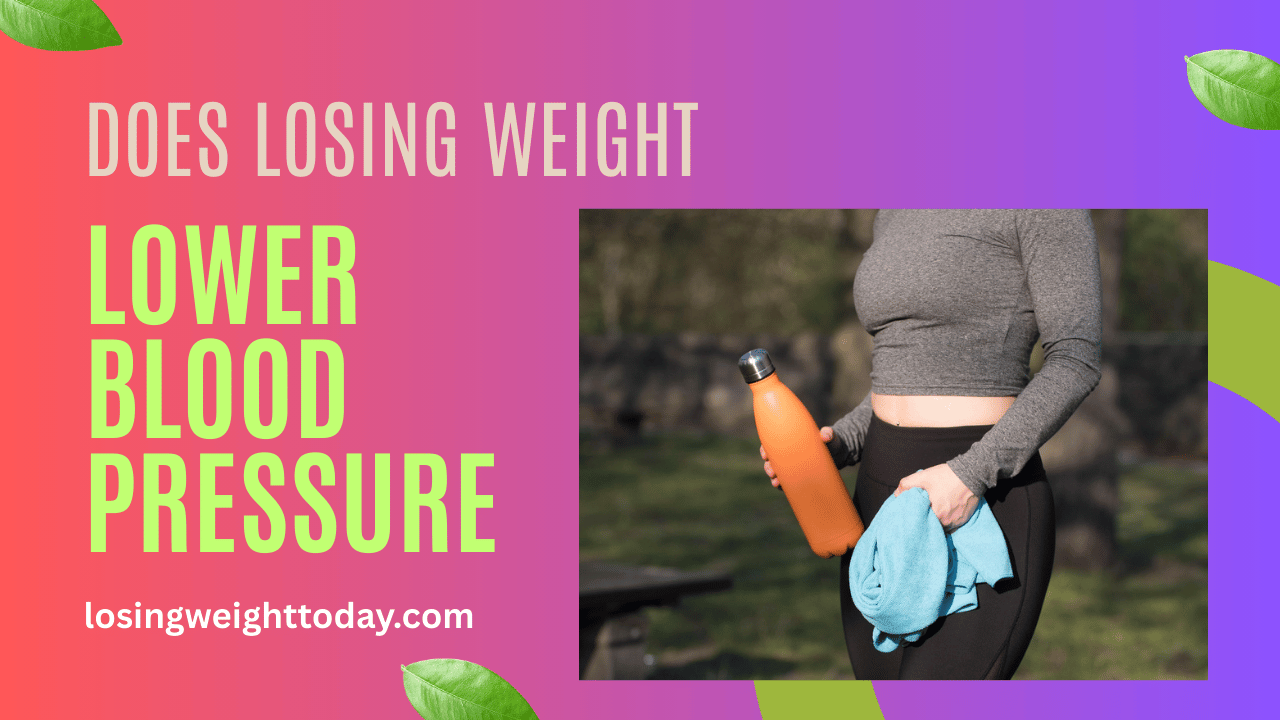Hypertension, or high blood pressure, is a leading risk factor for heart disease, stroke, and other serious health conditions. With about one in three adults in the United States affected by high blood pressure, it’s a growing concern that necessitates effective management strategies. One of the most significant lifestyle changes people can make to promote better cardiovascular health is weight loss. But how exactly does losing weight influence blood pressure? This article explores the connection between weight loss and blood pressure, the mechanisms behind this relationship, and practical strategies for achieving and maintaining a healthy weight.

Understanding Blood Pressure
Before delving into the relationship between weight and blood pressure, it’s essential to understand what blood pressure is. Blood pressure is the force exerted by circulating blood against the walls of blood vessels. It is usually represented by two numbers: systolic (the pressure during heartbeats) and diastolic (the pressure between heartbeats), measured in millimeters of mercury (mmHg). Normal blood pressure is generally considered to be around 120/80 mmHg. Hypertension is diagnosed when blood pressure readings consistently exceed 130/80 mmHg.
The Link Between Weight and Blood Pressure
1. Risk Factors for Hypertension
Obesity is recognized as one of the significant risk factors for developing hypertension. Extra body weight can create additional strain on the heart, leading to increased blood pressure. The correlation between weight and blood pressure is well-established: research shows that as body weight increases, blood pressure tends to rise as well.
2. Mechanisms Behind Weight Loss and Blood Pressure Reduction
Several physiological mechanisms help explain how losing weight can reduce blood pressure:
- Reduced Blood Volume: Losing weight often leads to a decrease in blood volume. This reduction means there is less fluid circulating through the blood vessels, leading to lowered pressure on the vessel walls.
- Reduced Vascular Resistance: Excess fat, especially visceral fat located around the organs, can contribute to increased resistance in blood vessels. Weight loss can decrease this resistance, allowing blood to flow more freely and reducing pressure.
- Improved Insulin Sensitivity: Excess weight is associated with insulin resistance, a condition that can lead to hypertension. Weight loss increases insulin sensitivity, which can help regulate blood pressure more effectively.
- Hormonal Changes: Fat cells produce hormones that can influence blood pressure, including leptin (which can contribute to increased blood pressure) and adiponectin (which can have a lowering effect). Weight loss leads to a favorable alteration in the balance of these hormones.
3. Clinical Evidence Supporting Weight Loss and Blood Pressure
Numerous studies support the connection between weight loss and lower blood pressure. A study by the American Heart Association evaluated individuals with pre-hypertension and hypertension, indicating that a modest weight loss of 5% to 10% can reduce systolic blood pressure by approximately 5 to 20 mmHg.
Another analysis found that every kilogram (approximately 2.2 pounds) of weight lost was associated with an average drop in systolic blood pressure of 1 mmHg. These findings emphasize the importance of weight management as a therapeutic strategy for controlling hypertension.
Strategies for Effective Weight Loss
While understanding the benefits of weight loss is crucial, knowing how to lose weight effectively is equally important. Here are some practical strategies to help individuals achieve and maintain a healthy weight, potentially lowering blood pressure in the process:
1. Adopt a Balanced Diet
A balanced diet rich in fruits, vegetables, whole grains, and lean proteins is foundational for weight loss. The DASH (Dietary Approaches to Stop Hypertension) diet, in particular, focuses on foods low in sodium and high in nutrients that can help lower blood pressure. This includes foods rich in potassium, magnesium, and calcium.
2. Monitor Portion Sizes
Being mindful of portion sizes can help control caloric intake. Using smaller plates and bowls, reading food labels, and understanding serving sizes are practical ways to prevent overeating.
3. Increase Physical Activity
Regular physical activity is essential for weight management and overall health. Aim for at least 150 minutes of moderate aerobic exercise or 75 minutes of vigorous exercise per week. Incorporating strength training exercises at least twice a week can also enhance metabolism and aid in weight loss.
4. Stay Hydrated
Drinking plenty of water can help promote weight loss by reducing hunger and replacing high-calorie beverages. Additionally, staying hydrated can support cardiovascular health, as dehydration can lead to increased blood viscosity and potentially elevated blood pressure.
5. Limit Sodium Intake
Reducing sodium intake is critical for managing blood pressure. The American Heart Association recommends aiming for no more than 2,300 mg per day, with an ideal limit of 1,500 mg for those with hypertension or at risk. This involves choosing fresh, whole foods over processed foods, which are generally higher in sodium.
6. Prioritize Sleep and Stress Management
Chronic stress and poor sleep can both contribute to weight gain and elevated blood pressure. Implementing relaxation techniques, such as deep breathing, meditation, or yoga, can help manage stress. Prioritizing quality sleep, aiming for 7-9 hours per night, can also support weight management.
The Role of Healthcare Professionals
Consulting with healthcare professionals can provide essential support for individuals looking to lose weight and manage their blood pressure. A registered dietitian can help develop a personalized meal plan that aligns with individual health needs and preferences. Additionally, a healthcare provider can monitor blood pressure levels and other health markers, ensuring a systematic approach to weight loss and blood pressure management.
Conclusion
The evidence is clear: losing weight can significantly lower blood pressure, making it a vital strategy for anyone struggling with hypertension. Through understanding the underlying mechanisms and employing effective weight loss strategies, individuals can take proactive steps toward better cardiovascular health. However, it’s crucial to remember that lifestyle changes take time and consistency. With a commitment to dietary adjustments, physical activity, and overall self-care, achieving and maintaining a healthy weight can lead to improved blood pressure and a healthier life.
In summary, weight loss is not just about aesthetics; it has profound implications for health, especially for individuals grappling with hypertension. By prioritizing weight management, we can take charge of our health and build a foundation for a longer, healthier life.


